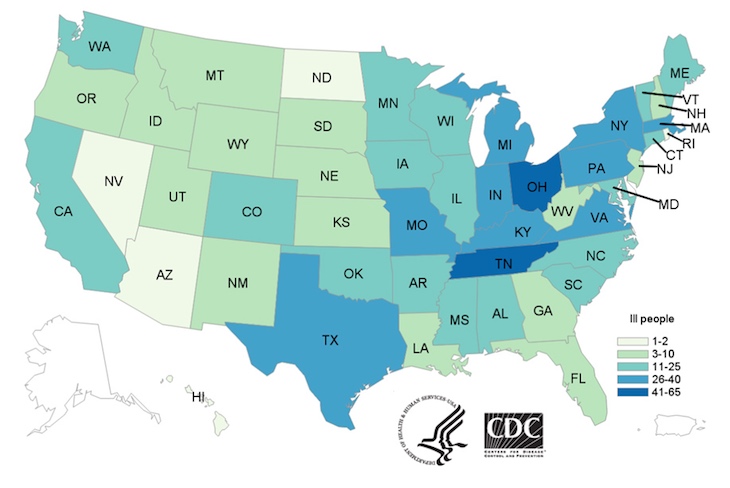The ongoing backyard poultry Salmonella outbreak has now sickened at least 768 people in 48 states, according to the Centers for Disease control and Prevention (CDC). One hundred twenty-two people have been hospitalized, and two people have died. The only states that do not have any ill persons are Alaska and Delaware.

The case count by state is: Alabama (15), Arkansas (11), Arizona (2), California (20), Colorado (14), Connecticut (17), Florida (5), Georgia (6), Hawaii (2), Idaho (8), Illinois (20), Indiana (26), Iowa (14), Kansas (7), Kentucky (30), Louisiana (6), Maine (14), Maryland (17), Massachusetts (27), Michigan (27), Minnesota (13), Mississippi (12), Missouri (27), Montana (3), Nebraska (8), Nevada (1), New Hampshire (7), New Jersey (9), New Mexico (3), New York (38), North Carolina (24), North Dakota (1), Ohio (62), Oklahoma (12), Oregon (10), Pennsylvania (37), Rhode Island (2), South Carolina (12), South Dakota (4), Tennessee (55), Texas (39), Utah (8), Vermont (13), Virginia (39), Washington (12), West Virginia (9), Wisconsin (15), and Wyoming (5). Since the last update on June 13, 2019, an additional 489 people and eight states have been added to the outbreak total.
Five more serotypes of Salmonella have also been added. The strains of Salmonella linked to this outbreak are Agona, Alachua, Anatum, Braenderup, Enteritidis, Infantis, Manhattan, Montevideo, Muenchen, Newport, and Oranienburg.
Illness onset dates range from January 1, 2019 to July 6, 2019. The patient age range is from less than one year to 99 years.
Whole genome sequencing of 117 isolates taken from ill persons are resistant to one or more of these drugs: amoxicillin-clavulanic acid, ampicillin, cefoxitin, ceftriaxone, chloramphenicol, ciprofloxacin, fosfomycin, gentamicin, kanamycin, nalidixic acid, streptomycin, sulfisoxazole, tetracycline, and trimethoprim-sulfamethoxazole. This resistance can make the infections more difficult to treat.
Twenty-nine percent of people sickened in this outbreak have been hospitalized, which is higher than the typical Salmonella outbreak hospitalization rate of 20%. Two people have died; they lived in Texas and Ohio. Significantly, 156, or 24%, of these illnesses have occurred in children younger than five years.
Children under the age of five should not handle live poultry or touch chicks or ducklings. No one should kiss backyard poultry or snuggle the birds. Adults should aways supervise young children’s handwashing, especially after they have been in contact with animals. These birds can be carriers of pathogenic bacteria and show no symptoms.
Further, poultry should be kept outdoors. Anyone caring for them should wash their hands with soap and water immediately after touching them or anything in the area where they live or roam. Set aside a pair of shoes that you use exclusively in the chicken area and only wear them there. And stay outdoors when cleaning equipment, cages, or water or food bowls.
All evidence indicates that contact with backyard poultry, such as ducklings and chicks, from multiple hatcheries are the like source of this outbreak. In interviews with 315 ill persons, 237, or 75%, said they had contact with chicks or ducklings before they got sick. The poultry was sourced from agricultural stores, websites, and hatcheries.
Symptoms of a Salmonella infection include diarrhea that may be bloody, a fever, chills, nausea, and vomiting. Symptoms usually start 12 to 72 hours after exposure. Salmonella infections can spread to the bloodstream and cause sepsis, which can be fatal. If you have been around live poultry, such as chicks or ducklings, and have been ill with these symptoms, see your doctor. You may be part of this backyard poultry Salmonella outbreak.




